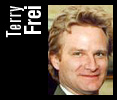 | |
 |

|
| Tuesday, September 24 NHL taking the crunch out of numbers By Terry Frei Special to ESPN.com |
||||||||||||||||||||||||||||||||||||||||||||||||||||||||||||||||
|
A scene from the summer of 2005: An agent is on the phone with a NHL general manager, making it clear that the player involved deserves a significant raise because of his wide-ranging contributions.
The GM replies: "Prove it." And the agent can't. At least not officially. Blocked shots, hits, giveways and takeaways, all part of the statistical package distributed the past two seasons under the league's generally well-received "Real-Time Scoring System," have been scrubbed on each player's summary line this season. (Missed shots, which were kept on a game-by-game basis but not compiled and distributed, also got the axe.) Coaching staffs are free to keep those figures, or reconstruct them from video work, of course, so it's not inconceivable that the statistics will be on file (and leakable) somewhere. The NHL's official explanation does have some merit: The categories -- especially hits, giveaways, and takeaways -- involved subjective judgments that could vary from building to building, from NHL-paid stats crew to stats crew, a hard-working and usually reliable group of men and women camped out at laptop computers. And unless a reasonable degree of uniformity could be guaranteed through all the crews, those most subjective statistics could be dubious. Also, because the scoring crews will be called upon to monitor and record information about whether game officials are following the hurry-up procedures mandated in the new face-off rules, they will add some duties during stoppages. Quick: Who led the NHL in hits last season?
A. Robert Svehla Svehla did, and he is only slightly less of an unlikely choice than Ronning. The Panthers-turned-Leafs' defenseman officially was credited with 386 hits, 13 more than the wandering Lithuanian, Kasparaitis, and 56 more than the hulking American, Hatcher.
The suspicion here is that general managers didn't like having those blocked shots carom right back at them -- in contract negotiations and arbitrations, especially involving role players who need to find numbers to support their arguments anywhere they can. (That's along the same lines of an underplayed problem in the game today: Some GMs and owners aren't as bothered by the dearth of scoring as they let on, because it is about the only factor going against the grain of salary-growth pressures. If some of those men had their way, they'd push through a measure allowing only one assist on each goal.) Whether it's Hans Jonsson or Eric Messier or Brad Werenka, the guys who are either savvy enough or stupid enough (or both) to block shots, deserve to have their unique shot-blocking contributions quantified. The NHL prides itself on an all-for-one attitude that, while not universal, at least is more prevalent than in the other major sports. NHL men love to talk about role players' selflessness, and to take away one of the few ways to measure as aspect of it, is a bit hypocritical. The elimination of some categories also enables the league to, in effect, lay off members of the scoring crews in each city and save money. The reduction in game-night expenses is a drop in the puck bucket, of course, in the overall picture, but every little bit helps -- and don't dare ask why GMs usually hold their meetings in places like high-priced Palm Springs. Real-Time Scoring, especially with its breakdown of playing time, and has been a significant step forward in the information age for the NHL. One of the possible perils was that it could have turned hockey writers and broadcasters into a bunch of number crunchers, a trend that has greatly diluted the quality of baseball writing and commentary in the past decade. ("Johnson, who is hitting .272 with runners on base on artificial turf in night games, and …" Zzzzz.) Yes, there have been times the numbers game has gotten out of hand, especially in broadcast graphics, but Real-Time Scoring didn't create too much of a monster. There have been a few bugs in the system. The thinned-out stats crews also will have their attention focused more on faceoffs, which will happen more quickly this season. But the league shouldn't have given up so quickly on the previous statistical package, especially blocked shots. Terry Frei is a regular contributor to ESPN.com. His book, "Horns, Hogs, and Nixon Coming," will be published by Simon and Schuster in December. It can be pre-ordered at Amazon.com or BarnesandNoble.com.
|
| |||||||||||||||||||||||||||||||||||||||||||||||||||||||||||||||
